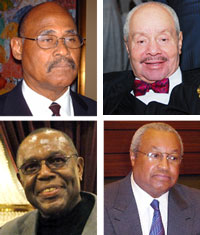A Tribute to the Hon. Elijah Muhammad
By Fabraye Muhammad | Last updated: Jun 11, 2009 - 11:09:35 AMWhat's your opinion on this article?
MARIETTA, GA. (FinalCall.com) - Only miles North of downtown Atlanta, at the Crowne Plaza Hotel, May 24 approximately 200 attendees at the Black Power Conference filed into one of their main workshops of the weekend event—A Tribute to the Most Honorable Elijah Muhammad.

Clockwise (L-R) Wali Bahar, Abdul Rahman Muhammad, Abdul Akbar Muhammad, Silis Muhammad
‘It was the boldness of the Messenger that attracted me. I figured a man who openly challenged the Caucasian government was a bad dude and I was with him. The Teachings encouraged right, healthy living that kept money in the family, household and community.' —Abdul Rahman Muhammad |
“Usually in a nationalist or revolutionary conference the name of the Honorable Elijah Muhammad is not mentioned,” Atty. Shabazz began. “But we must pay tribute to one of the greatest men of honor in our history—the Honorable Elijah Muhammad.”
“Division within our Black nation must be resolved. Allah demands it!” Atty. Shabazz said. “We must not attack each other, only the enemy to our unity,” he continued, prior to introducing the session's powerful panel.
Panelists represented and shared a cross-section of ideological views, perspectives and interactions with Mr. Muhammad, known to all as the Messenger of Allah to the Black nation and the world.
The dais included Dr. Leonard Jeffries, historian and conference co-convener; Silis Muhammad, Lost-Found Nation of Islam and his wife Misshaki Muhammad; Imam Akbar Bilal, American Muslim Mission; Ministers Abdul Rahman and Abdul Akbar Muhammad, Nation of Islam pioneers; Wali Bahar, pioneering helper of the Messenger; and Dr. Wesley Muhammad an Islamic scholar.
“The Honorable Elijah Muhammad is one of the most important bridges Black people could have on our way to greatness,” Dr. Jeffries noted. He added that Mr. Muhammad was profound in implementing scientific methods in the process of redemption. “He recognized the importance of describing our circumstances, analyzing and prescribing the problem and solution and implementing system analysis,” Dr. Jeffries said that approach made the Nation of Islam the “model for the resurrection of African people in the new world.”
The Honorable Silis Muhammad shared his pleasure with having come to the event. “You know how you can spot a person in your midst trying to be ‘all that,' but they ain't? ... Well The Honorable Elijah Muhammad was the exact opposite. He was real,” Mr. Muhammad shared before introducing his wife.
Misshaki Muhammad, wife of Silis Muhammad and Muslim pioneer, recalled that her first lessons from Mr. Muhammad were about his teacher, Master Fard Muhammad. “Later I worked for him, and he worked us hard, just as hard as he worked himself,” she began. “But, we were so happy to be able to step in and be part of making a nation. It didn't matter that we didn't know this or that. We learned by research and study.”
“The Messenger was a wonderful, kind, and multi-faceted man,” Mrs. Muhammad shared. “He was balanced—a teacher of humility, a comedian at times, and a leader by example.”
“It is in that spirit of unity that we must be thankful for the Teachings of The Honorable Elijah Muhammad,” said Imam Bilal.
“It was the boldness of the Messenger that attracted me,” Min. Abdul Rahman Muhammad said. “I figured a man who openly challenged the Caucasian government was a bad dude and I was with him.” Min. Rahman Muhammad noted that the government didn't like the Messenger because he interfered with their economy. “The Teachings encouraged right, healthy living that kept money in the family, household and community.”
“The Honorable Elijah Muhammad was a true transformer. We must understand he is the Messenger of Allah, and we can't put him in the same class as his students,” Min. Rahman Muhammad added.
A. Akbar Muhammad spoke on the importance of leaving a legacy of unity for children—youth raised in and out of the mosque or related organizations. “We must bridge the gap of unity among us and allow our children access and knowledge of our history,” Min. Akbar Muhammad said. “We have one common goal—the redemption of our people. We can't split hairs while our people are going to hell. We don't have to agree on everything to love one another, just deal in a spirit of sincerity and love.”
Atty. Shabazz introduced pioneer Wali Bahar as a legendary trainer of men. Mr. Bahar encouraged conference attendees to learn more about the Honorable Elijah Muhammad. “To know about the man, you must know about what's inside the man,” he said, adding that he sees the Hon. Minister Louis Farrakhan “as a breath of life to us all.”

Dr. Wesley Muhammad
|
“It is Point No. 12 of ‘What The Muslims Believe' that started my research along with the desire to prove them to the world. It just shows what the light of the spark of one thought can lead to,” Dr. Muhammad said.
INSIDE STORIES AND REVIEWS
-
-
About Harriett ... and the Negro Hollywood Road Show
By Rabiah Muhammad, Guest Columnist » Full Story -
Skepticism greets Jay-Z, NFL talk of inspiring change
By Bryan 18X Crawford and Richard B. Muhammad The Final Call Newspaper @TheFinalCall » Full Story -
The painful problem of Black girls and suicide
By Charlene Muhammad -National Correspondent- » Full Story -
Exploitation of Innocence - Report: Perceptions, policies hurting Black girls
By Charlene Muhammad -National Correspondent- » Full Story -
Big Ballin: Big ideas fuel a father’s Big Baller Brand and brash business sense
By Bryan Crawford -Contributing Writer- » Full Story






 Click Here Stay Connected!
Click Here Stay Connected!








